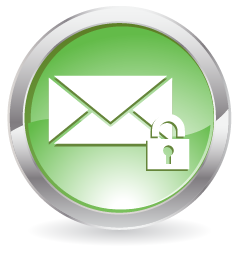Consumer Alerts
Email Fraud and Security
Learn About Spoofs
Every Internet user should know about spoof (a.k.a. phishing or hoax) e-mails that appear to be from a well-known company but can put you at risk.
Although they can be difficult to spot, they generally ask you to click a link back to a spoof web site and provide, update or confirm sensitive personal information. To bait you, they may allude to an urgent or threatening condition concerning your account.
A spoof web site is one that mimics a popular company's website to lure you into disclosing confidential information. To make spoof sites seem legitimate, thieves use the names, logos, graphics and even code of the real company's site.
They can even fake the URL that appears in the address field at the top of your browser window and the padlock that appears in the lower right corner. Lock The links in the spoof e-mails almost always take you to a spoof web site.
Spoof e-mails are after:
- Password or PIN
- Credit Card Validation (CCV) code
- ATM/Debit or Credit Card number
- Social Security number (SSN)
- Bank account number
Even if you don't provide what they ask for, simply clicking the link could subject you to background installations of Key Logging software or viruses.
Key logging is another method used to capture your personal information. Here's how it works. You click on a link to a website or open an attachment that secretly installs software on your computer.
Once installed, it records everything you type, including any User IDs, Passwords and account or personal information. Thieves know how to retrieve this information, or even set it up to automatically have it sent back to them! This is a very real risk when using public or shared computers such as those in Internet cafes.
Tips to help you protect yourself from becoming a victim of spoofing.
These tips can help you protect yourself from becoming a victim of spoofing.
- Make sure your computer has the most current anti-virus software and personal firewall.
- Don’t click on links in unsolicited e-mails, especially those asking for personal information.
- Go directly to any site by typing its address (URL) into your browser and bookmark it.
- Setup a Login Cookie because a spoof web site will not be able to display your User ID. Note: Never set up a login cookie on a public or shared computer.
- Create a hard to guess password and make it unique.
- Change your password frequently. Every 30-60 days are recommended.
- Keep track of your account.
Signs of Spoof E-mail
Although there’s no foolproof formula for spotting spoof e-mail, these signs should arouse your suspicion.
- Sense of Urgency. Example: Your account will be closed or temporarily suspended.
- Embedded Links. These links may take you to spoof sites that ask you to enter, confirm, or update sensitive personal information.
- Spelling errors. These help spoof e-mails avoid spam filters.
Report a Spoof
When you report fraudulent e-mails we work aggressively with law enforcement agencies to investigate them.
If you suspect that you've received a fraudulent e-mail, please forward it to us at customerserv@fmbcornerstone.com.
Note: Don't change or retype the subject line—this inhibits our ability to properly investigate it. After forwarding the e-mail, you should delete it from your inbox.
You may also want to forward it to the Federal Trade Commission at: spam@uce.gov or contact them at: www.consumer.gov/idtheft or 1-877-IDTHEFT.
Stay Alert
No one is as familiar with your accounts as you are. That's why regularly monitoring your account activity is one of the best ways to safeguard yourself against fraud.
- Review your account details. Look for transactions that you don’t recognize.
- Set up login cookies – Many websites offer to remember your UserID. This way, when you return to the site to sign on, your User ID will be visible in the Sign on box. A spoof web site will not be able to display your User ID. Note: Never set up a login cookie on a public or shared computer.
- Check your credit report regularly. For a copy of your credit report, contact:
Equifax 1-800-685-1111 Experian 1-888-397-3742 TransUnion 1-800-916-8800
Stay Current
To help protect your accounts on an ongoing basis, there are a few measures we recommend that you take.
- Change your User ID and Password periodically – every 30-60 days are recommended.
- Create a hard to guess password and make it unique.
- Keep your browser and operating system up to date. You can usually download important security enhancements and updates for free from the vendor’s website.
- Update your anti-virus software regularly. Anti-virus software needs frequent updates to guard against new viruses.
Use a personal firewall. Many internet service providers (ISPs) offer this feature, which protect your home computer against unauthorized access by hackers.


